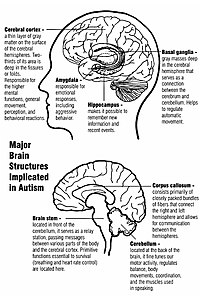
Photo from wikipedia
Background and Objectives Low free triiodothyronine (FT3) is usually associated with worse functional outcome in critical illness; however, the information on thyroid dysfunction and autoimmune encephalitis (AE) is limited. This… Click to show full abstract
Background and Objectives Low free triiodothyronine (FT3) is usually associated with worse functional outcome in critical illness; however, the information on thyroid dysfunction and autoimmune encephalitis (AE) is limited. This study aims to evaluate the clinical prognostic value of thyroid function and low-T3 syndrome in patients with multiple subtypes of AE. Methods In this retrospective study, we identified the hospital records of 319 candidate patients with AE admitted between January 2016 and December 2020. We then extracted the clinical features and outcomes. Modified Rankin scale (mRS) scores were used to evaluate the patients’ neurological function. The serum levels of FT3, free thyroxine (FT4), and thyroid-stimulating hormone (TSH) were measured upon admission. Normal thyroid stimulating hormone level with FT3 below the lower limit of the reference interval (2.63 nmol/L) was defined as low-T3 syndrome. Results A total of 237 AE cases remained after screening. Among these, 57.81% (137/237) were men and the average age at onset was 41 y (interquartile range, 12–61 y). We found that 83.54% (198/237) of the patients had a good prognosis, and 16.46% (39/237) had a poor prognosis. Abnormal thyroid function was observed in 30.80% of these patients, with a relatively greater prevalence in the group with a poor prognosis (p < 0.001). The serum FT3 levels in the poor-prognosis group were significantly lower than those in the good-prognosis group (p < 0.001). Low-T3 syndrome occurred in 15.19% of AE cases and was more frequent in patients with poor prognosis (p < 0.001). Conclusions Abnormal thyroid function in AE is frequent, and serum FT3 levels in patients with poor prognosis are significantly lower than in those with good prognosis. Low-T3 syndrome could be a potential candidate for predicting the prognosis of AE following future research.
Journal Title: Frontiers in Immunology
Year Published: 2022
Link to full text (if available)
Share on Social Media: Sign Up to like & get
recommendations!